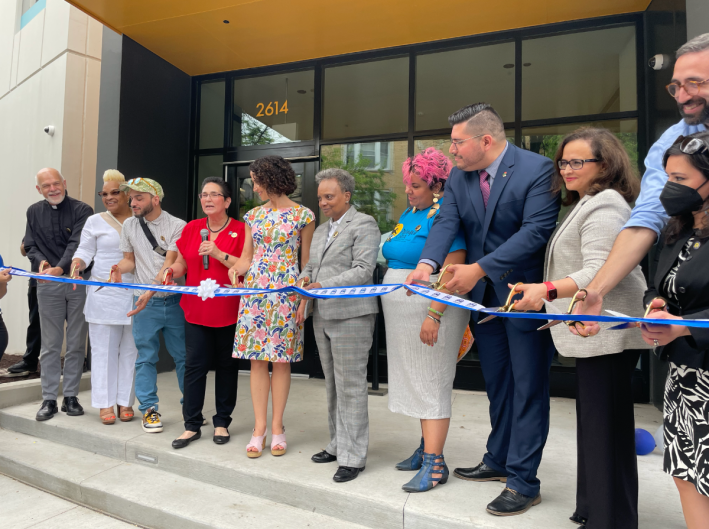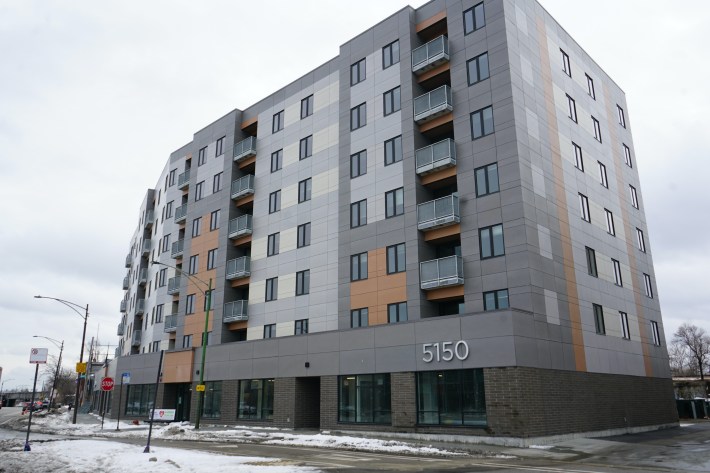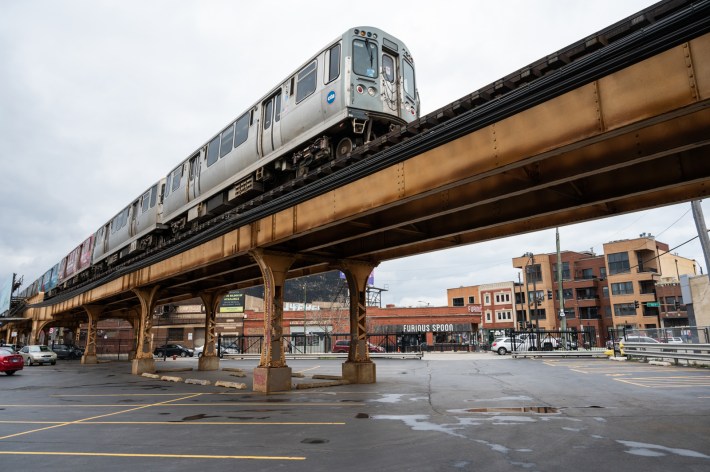Chicago Approves Landmark Effort To Boost Affordable Housing Near Transit And Stall Gentrification
Table of Contents
Toggle [ad_1]
CHICAGO — A sweeping housing effort officials say will support battle segregation, strengthen economical housing on the South and West sides and gradual displacement in gentrifying neighborhoods was authorized by Metropolis Council Wednesday.
The “Connected Communities” ordinance incorporates provisions aimed at producing additional affordable housing in close proximity to mass transit, receiving inexpensive developments in front of Town Council quicker, limiting the place multi-unit properties can switch single-spouse and children households and much more.
The ordinance was released very last month after getting drafted by Mayor Lori Lightfoot’s Housing Division. A watered-down edition was accepted Wednesday in a 36-10 vote.
A single of the signature capabilities of the bill is increasing the city’s transit-oriented development application, intended to spur more cost-effective housing in the vicinity of general public transit hubs.
Transit-oriented developments can now be developed within just a two-block radius of teach stations. The ordinance expands that length to 4 blocks.
The monthly bill also makes it possible for developers to develop much less parking spaces in new properties within just a specified length from CTA and Metra stations, as very well as sure popular bus lines.
The monthly bill also strengthens cost-effective prerequisites for new transit-oriented buildings and limits builders to 1 parking place for each individual two household models in new structures near coach stations.
Economical housing advocates and developers across the town have praised the enlargement of the program, stating it will encourage builders to construct a lot more reasonably priced models and increase community density.
“It’s only been as of late that we’ve really noticed more transit-oriented developments that are both 100 % inexpensive or have fantastic affordability in them. And I consider insurance policies that really encourage affordability, offer for higher density all over transit nodes, that to me, helps make feeling,” mentioned Pleasure Aruguete, CEO of Bickerdike Redevelopment Corporation, which manages extra than 1,000 models of affordable housing on Chicago’s Northwest Side.
Bickerdike not too long ago opened the Lucy Gonzalez Parsons Apartments, an all-economical transit-oriented progress up coming to the Logan Sq. Blue Line station.
 Credit score: Quinn Myers/Block Club Chicago
Credit score: Quinn Myers/Block Club ChicagoBut some aldermen bristled at the inclusion of a provision in the invoice that threatens 1 avenue of aldermanic prerogative, the casual practice that has usually permitted Town Council associates ultimate say in zoning and other issues in their ward.
The legislation calls for any affordable housing project proposed in a wealthier place to acquire an up or down zoning committee vote in a 12 months.
That led Ald. Brian Hopkins (2nd) to vote versus the monthly bill in committee and at Town Council Wednesday.
“I really do not know why you would involve this poison capsule. It is just, it is so objectionable, it is not a precedent that we want to set. It is not a accountable way to govern,” Hopkins mentioned. “And I really do not want to start off opening the doorway in which committees of this Town Council will be pressured to consider votes on an artificial timeframe.”
Given that transit-oriented progress was released in Chicago in 2013, a extensive majority of this sort of structures have been developed on the North Facet, Downtown or West Loop, officers explained.
“Ninety % of [TOD] ended up not on the South and West sides, in which we know that we also have enough prepare, Metra and bus assistance,” housing commissioner Marisa Novara explained throughout a zoning committee assembly Tuesday.
Officers hope the extension of incentives will make it possible for far more adaptability for builders to help you save revenue on parking areas and garages, making it less expensive for projects to proceed.
The ordinance also moves to contain far more bus lines in the application, which housing officers argue will support expand progress to locations not instantly served by train stations, frequent in parts of the South and West sides.
South Aspect economical housing developer Leon Walker praised the bill at the zoning meeting, arguing it allows lower barriers for builders eyeing new jobs.
“This ordinance allows advertise density and presents a path to decrease parking prerequisites in these developments,” stated Walker, a handling companion at DL3 Realty, which is powering developments like Englewood Square.
“For me and for quite a few other folks, who we are attempting to encourage to get into growth, community growth in their personal communities, this delivers a level of certainty,” he explained. “The timelines, the comprehension of how a advancement can be executed in a expense successful, still higher good quality manner, needs to occur.”
 Credit: Ariel Parrella-Aureli/Block Club Chicago
Credit: Ariel Parrella-Aureli/Block Club ChicagoUnderneath the ordinance, developers or land entrepreneurs must request a zoning change if they want to create a one-loved ones dwelling in Logan Square and other gentrifying communities that are zoned for multifamily housing.
These provisions will in the long run usher a lot more economical housing into neighborhoods that want it the most, proponent Ald. Daniel La Spata (1st) stated.
“It applied to be that builders could choose and decide on what they preferred TOD to suggest. Do I want it just to be added density? Or do I just want it to imply scaled-down models? Or do I want to have a ton of parking or no parking? We effectively remaining it up to a developer to outline TOD for on their own. Now we’re putting stronger guardrails up,” La Spata stated.
However, La Spata claimed he would’ve preferred the coverage “to shift further” when it comes to preserving two- and 3-flats in wealthier, transit-rich communities like Logan Sq.. A provision allowing for for a few-flats in individuals regions was stripped from this ordinance.
Traolach O’Sullivan, a housing organizer with Logan Square-based group Palenque LSNA, claimed Logan Square has benefitted from the growth pilot method, and this ordinance makes certain other communities in require, specially these on the South and West Sides, get that same option.
 Credit rating: Colin Boyle/Block Club Chicago
Credit rating: Colin Boyle/Block Club ChicagoSubscribe to Block Club Chicago, an unbiased, 501(c)(3), journalist-run newsroom. Every single dime we make funds reporting from Chicago’s neighborhoods.
Click right here to assist Block Club with a tax-deductible donation.
Many thanks for subscribing to Block Club Chicago, an unbiased, 501(c)(3), journalist-run newsroom. Every dime we make funds reporting from Chicago’s neighborhoods. Click here to aid Block Club with a tax-deductible donation.
Listen to “It’s All Fantastic: A Block Club Chicago Podcast”:
[ad_2]
Resource website link
